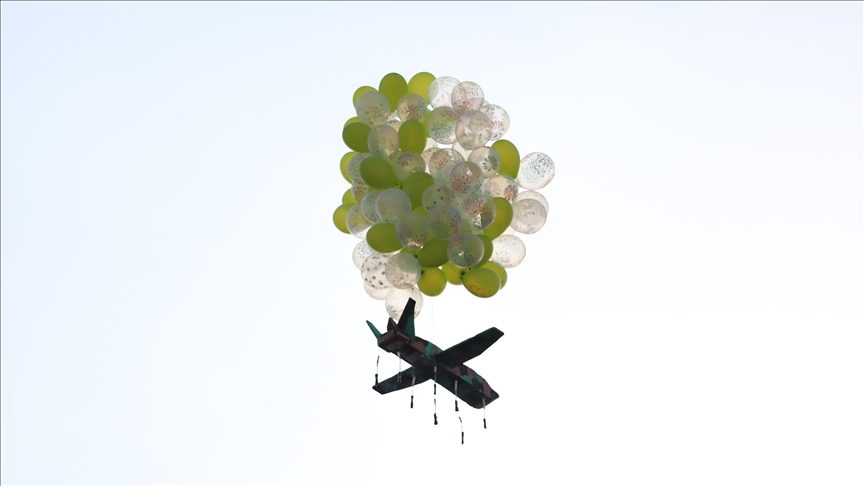GAZA CITY, Palestine
Palestinians resumed the launch of incendiary balloons from the Gaza Strip into Israel for the first time since 2021.
Analysts believe that the move is part of Palestinian efforts to draw attention to the 16-year-long Israeli blockade on the seaside enclave.
The balloon launch came amid Palestinian protests over the past week near a security border fence with Israel, which drew Israeli airstrikes against Hamas positions in Gaza.
Palestinian group Hamas, which rules the Gaza Strip, did not publicly say it was behind the current protests near the Gaza border. The group spokesman, however, said the protests were a “natural” result of the current tension in the Palestinian territories.
“This is an expression of Palestinian anger to the [settler] incursions into Al-Aqsa Mosque in Jerusalem, assassinations, killings and the Gaza siege,” Hazem Qasem told Anadolu.
Tension has been running high across the occupied West Bank in recent months amid repeated Israeli military raids into Palestinian towns.
More than 230 Palestinians were killed by Israeli fire since the start of this year, according to the Health Ministry. At least 35 Israelis were also killed in separate Palestinian attacks during the same period, according to Israeli figures.
Tension escalated as hundreds of Israeli settlers forced their way into the flashpoint Al-Aqsa Mosque complex in occupied East Jerusalem in recent days to celebrate Jewish holidays.
For Muslims, Al-Aqsa represents the world’s third-holiest site. Jews, for their part, call the area the Temple Mount, saying it was the site of two ancient Jewish temples.
Qasem termed the Israeli airstrikes on Hamas military sites as “an attempt to intimidate the rebellious youth and force them to stop the protests.”
“Despite the repeated attacks against our sites, Hamas will continue to support the struggle whether in Gaza, the West Bank or Jerusalem,” the spokesman said.
“We are in an open war with the occupation,” he added.
Economic facilities
Osama Mohamed, a political analyst, said the protests were an attempt to draw attention to the Israeli siege on Gaza.
“It’s an attempt to find a solution to the Gaza siege and resolve the economic crisis in the strip,” Mohamed told Anadolu.
“Politically, these demonstrations are a tool of confrontation with Israel that was effective in previous years,” he added.
Hamas did not give details about any political crisis in Gaza. Its government, however, has recently reduced salaries by five percent.
Last month, the Budget and Financial Affairs Committee of the Hamas-run parliament announced a budget deficit of 116 million shekels ($30.3 million) since 2021, according to the Hamas-run Al-Rai news agency.
The political analyst opines that humanitarian and economic facilities could be offered to the Palestinians to end the current tension.
“However, there is still a chance for a limited escalation dictated by the developments on the ground,” he added.
Shaker Shabat, an expert in Israeli affairs, said the balloon launch aims to pile pressure to break the Israeli siege and improve economic conditions in Gaza.
“There is still a chance for the situation to escalate if the [Israeli] violations and Gaza economic crisis continue,” he said.
“There is no party interested in escalating the situation into an open battle that carries huge costs,” Shabat added.
Political role
Ali Al-Awar, an expert in Israeli affairs, said economic and political reasons could be behind the launch of incendiary balloons and the ongoing protests near the Gaza border.
“Hamas is facing a severe economic crisis, especially with the tightening of restrictions on the Gaza crossings,” he told Anadolu.
On Thursday, Israel reopened the Erez crossing with Gaza to allow thousands of Palestinian workers to enter the country for the first time since Sept. 17.
“The closure of the crossing affects 18,000 workers who have permits to enter Israel for work. Those workers contribute to reviving the commercial activity [in Gaza] and giving the market a kind of purchasing power,” Awar said.
The expert opines that Hamas has lost its role as a major political player in the region after a tripartite summit in Egypt’s coastal city of Al-Alamein on Aug. 12 between the leaders of Egypt, Jordan and Palestine.
“Egypt and Jordan granted Palestinian President Mahmoud Abbas full legitimacy to manage the affairs of the Palestinian people and the umbrella Palestine Liberation Organization (PLO) as well as the file of the Saudi-Palestinian relations,” he said.
“Hamas today is outside the political scene in the region,” Awar said.
The expert believes that Hamas backs the protests “in an attempt to return to the political scene again.”
“Hamas uses the incendiary balloons as a pressure tool without resorting to traditional military tools as this will not lead to an open battle with Israel,” he said.
Political messages
Awar thinks that the current state of tension is “temporary.”
“It may not last for long as it is expected to end with offering economic facilities to Gaza,” he said.
“Incendiary balloons are political messages sent to the parties concerned, and calm could be restored to Gaza by obtaining economic privileges,” the expert said.
He said the new facilities could include increasing the number of Palestinian workers with work permits in Israel to 20,000.
“It could also include facilities regarding agricultural exports from Gaza,” he added.
Though these facilities could not be enough for Hamas, Awar said, they would be “sufficient for restoring calm to Gaza and allowing Hamas to gain a political role in the region.”

